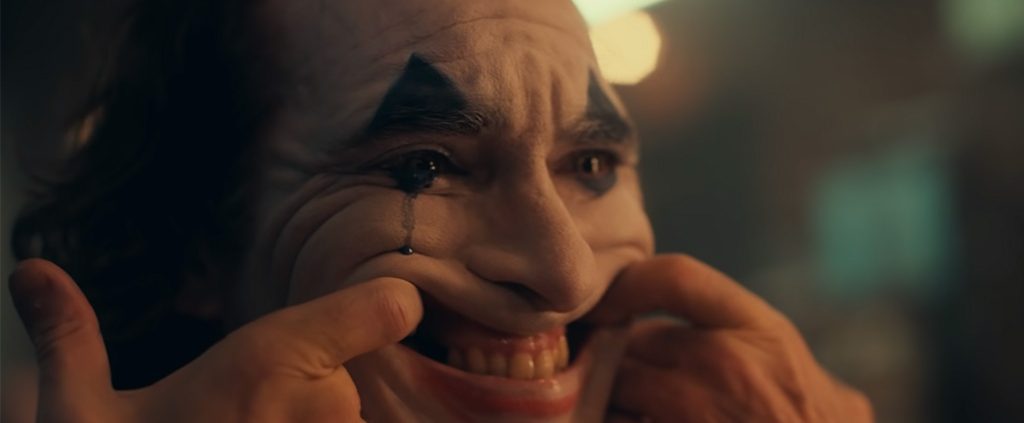Joker: Good News for the Outcasts, Losers, and Freaks?
Screenshot taken from Official Teaser Trailer
Written By Simon Moetara, New Zealand
Rating: 4.5/5 stars
SPOILER ALERT: This article contains mild spoilers.
Joker (2019) is unlike any comic-based film released so far; there are no costumes, no heroic battles, and not one bit of CGI on display. It’s a slow-burning character drama more concerned with personality than plot, as we follow Arthur Fleck’s transformation into the Clown Prince of Crime, the psychotic villain known as the Joker.
Joaquin Phoenix is mesmerizing in the role of Arthur Fleck, a sad, middle-aged clown-for-hire who lives with his mother. Fleck also suffers from mental illness and is on seven kinds of medication. He has a rare condition in which he bursts into uncontrollable fits of laughter at the most inappropriate times. He often takes refuge in a deep and rich fantasy life (and it’s difficult to know at times where imagination ends and reality begins).
Fleck lives in Gotham City circa 1981, a soulless concrete jungle that’s suffering from garbage strikes and giant rats living in the growing mounds of trash, and where the divide between rich and poor is on the rise. Rather than drawing on the latest DC film offerings, director Todd Phillips seems to derive inspiration from the urban grittiness and violence of the New Hollywood era cinema of the 1970s, from films like The French Connection (1971), Death Wish (1975), and Taxi Driver (1978). Gotham is a bleak, filthy, nasty place, and beneath the surface of its exasperated populace is a simmering and roiling frustration and rage ready to boil over.
Surviving in the Midst of A Horrific World
Theologian John McQuarrie argues that when we consider sin as not simply the action or even the attitude of an individual, but rather as “a massive disorientation and perversion of human society as a whole,” we can begin to see its truly horrific nature. We see this in communities or societal structures that violate human dignity and create greater inequity. According to McQuarrie, this social dimension of sin is particularly terrifying in that it makes a group or community “answerable to no one,” and exhibit “a hardness and irresponsibility that one rarely finds.”
And it’s in Gotham’s cruel world that the brutalized Fleck must try to survive. Sadly, it’s a world that doesn’t acknowledge, let alone care about, his existence. In one scene, Fleck confronts his social worker, saying, “You don’t listen, do you? I don’t think you ever really listened to me.” She responds that funding cuts mean they won’t be meeting again, before saying, “They don’t give a s**t about people like you, Arthur. And they really don’t give a s**t about people like me either.” The “hardness and irresponsibility” of Gotham’s broken system is plain to see.
In moments of vulnerability, Fleck is saddened by the rudeness and lack of civility between people. He longs for human connection, to be treated with warmth and dignity—to be loved. Sadly, such tenderness and affection evade him, and his awkward attempts to reach out and connect with those around him result in mockery, humiliation, and rejection.
Restoration and Hope for the Rejected
In a review for Empire, Terri White commented that in the current climate Joker could be viewed as “a lament for outsiders and the ignored,” but she felt such a reading was “too simple.” It’s true that this is an origin story, a dark interpretation of how one of DC’s greatest villains came to be, and we need to be careful of justifying Fleck’s eventual homicidal madness.
And yet I hear the plaintive lamentation for the excluded and overlooked that plays throughout Joker’s tale. I can’t help but wonder what might have happened if Arthur Fleck had received some of the love and acceptance—indeed, just the basic human respect and civility—that he longed for. Gotham city is a brutal place, and Fleck is constantly on the receiving end of its denizen’s harsh tongues, and ‘just for kicks’ beatings. He is seen as an outcast, a loser, a freak.
In Luke’s Gospel, Jesus read from the scroll of Isaiah:
The Spirit of the Lord is on me,
because he has anointed me
to proclaim good news to the poor. (Luke 4:18, NLT)
In the social world of Luke’s Gospel, “poor” meant more than those who have little or no money but was a broader category that referred to those of low social status, to social ‘outsiders’ and the marginalized. Jesus came “[t]o set the burdened and battered free” (Luke 4:18, MSG), and throughout Luke’s Gospel, we see Jesus bringing restoration and reversal for the life circumstances of so many people, inviting them into the family of God to experience His love and healing power.
Arthur Fleck’s circumstances are tragic and pitiable, and his naïve, almost child-like desire for affirmation and warmth is heartbreaking. He has suffered so much: parental rejection and a traumatic upbringing; lack of a supportive social network of friends and extended family; his mental health issues and lack of social skills; and an incessant barrage of verbal and physical abuse.
Fleck is an outsider, someone lacking status and dignity in his world, a man desperate for Good News, whose father-hunger could be assuaged by the love of the God who is a “father to the fatherless,” and whose yearning for familial love could be fulfilled, as “God sets the lonely in families” (Psalm 68:5-6).
Do We See the Forgotten?
One of the most relatable struggles Fleck faces is the difficulty of defining himself in a complex social world that bombards him with messages of his lack of worth. At various times, Fleck’s language reveals an inner-world filled with pain and futility: “I just don’t want to feel so bad anymore.” “Nobody saw me. I didn’t even think I existed.”
Psychologist Shahram Heshmat points out that “in the face of identity struggle, many end up adopting darker identities . . . as a compensatory method of experiencing aliveness or staving off depression and meaninglessness.” Fleck has had enough of his powerless existence at the hands of a faceless and brutal system. Sadly, his empowerment has come through travelling a dark and vicious path, and in embracing violence and mayhem.
As his metamorphosis into The Joker is almost complete, he rails, “Nobody thinks what it’s like to be the other guy . . . If it was me dying in the sidewalk. You’d walk right over me.” While Fleck paints a picture of indifference and despair, Christ offers another way. Jesus teaches us to love our neighbors as ourselves (Mark 12:31). This means looking out for other people’s wellbeing, to be aware of others and not just ourselves. The apostle Paul writes, “Let each of you look not only to his own interests, but also to the interests of others” (Philippians 2:4 ESV). Jesus tells the story of the Good Samaritan (Luke 10:25-37), a man who didn’t ‘walk right over’ a person in need but instead acted with compassion and loving service.
Even though Fleck’s life is filled with trauma and tragedy, there was another path available—albeit a narrow path, but one that leads to life. Drawing on Caleb Young’s wonderful conclusion, life under God is not meant to be a tragedy, or even a dark comedy, but a redemptive love story in which God draws us out of the muck and mire of our brokenness and into his family, where we can know ourselves as loved and accepted.









I haven’t seen the movie yet. Just reading,I totally agree that society helps create people like Joker,it’s reality. People takes as much as they can til it’s more than enough,then they snap. Medication doesn’t help everyone that’s the truth and reality.Honestly,you don’t have to have a mental illness to just snap,just pushed beyond breaking point! I’ve always loved the Joker for many reasons. I live in a cruel world like his,sadly. I just have good self-control,love my freedom,my living life.
I found the movie beautiful in a strange way. It honestly captured a person inside all of us. In Christian terms, the “sin” inside Joker is all of ours. So many Christian opinions were quick to say “no, no! we can’t glorify and empathize with murders!” But we ARE murderers…I was happy for a movie that allowed the public to weep. Especially as Americans, we shove our emotions so far down we call them evil, and can’t bare to see the reality inside ourselves. I wished I could hug Joker, and at the same time wondered how many Jokers I pass daily thinking nothing of them…thanks for the article!